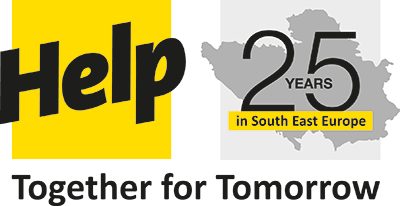Through continuous work, the organisation Help has spent the last 25 years cultivating and encouraging the inner force of people in the Western Balkans to help themselves and their communities
When you walk through a desert and suddenly come across an oasis – that is our image of Help, says Nenad Draganović, Deputy Director of the Sremska Mitrovica Correctional Institution.
 It was 25 years ago that the organisation Help-Hilfe zur Selbsthilfe from Germany delivered its first emergency aid in response to the crisis in the Balkans. Crises (conflicts, migrations…) heavily hinder sustainable development and prosperity. The need for emergency aid, the restoration of homes and support to economic growth endures year after year.
It was 25 years ago that the organisation Help-Hilfe zur Selbsthilfe from Germany delivered its first emergency aid in response to the crisis in the Balkans. Crises (conflicts, migrations…) heavily hinder sustainable development and prosperity. The need for emergency aid, the restoration of homes and support to economic growth endures year after year.
Help provided 36.5 million euros worth of emergency aid, de-mining and reconstruction in the first decade of its work in the Western Balkans.
Human dignity and the integration of particularly disadvantaged groups are always at the centre of Help’s work, be it in the context of emergency and reconstruction aid, vocational qualification or business start-ups and income generation activities.
Since 2001, Help has been targeting socio-economic development in the region. Help supports low income families, women, young people, prisoners and former prisoners and other disadvantaged groups in setting up sustainable business activities. Help provides necessary equipment, but also mentoring, management and vocational training for entrepreneurs, prisoners etc. towards more sustainable entrepreneurial endeavours.
Biljana, a 52-year-old lady from Pirot, was unemployed for nine years before being supported by Help in 2018. All her attempts to find work proved unsuccessful. Help provided Biljana with equipment and management training to set up a bakery. She had already completed an apprenticeship as a pastry chef. Her business is “Slane tajne” (literally – “savoury secrets”). She produces savoury cakes, cookies, muffins and other confectionery goods. Her small business increased her financial security and engaged all family members, including two of her three children who’d started their own families but, like many young people in the Balkans, rely on their parents’ support.
Within five to ten years, an average of 1.3 additional jobs is created in the companies that Help supported. The agriculture and craft sector plays a major role in the region, but services, the tourism sector and the IT industry have started to emerge.
Through the interaction of the measures and close cooperation with municipalities, ministries and the target group, entrepreneurs and thus families receive a stable income. In the long term, the economy is also strengthened sustainably.
To date a total of 13,141 micro and small enterprises have been supported by Help in the Western Balkan countries, with the value of that support amounting to 34.2 million euros. Refugees, internally displaced persons, socially vulnerable segments of the population and minorities all lack basic conditions and decent housing to start building their prosperity. Living in collective centres and informal settlements puts already marginalised people at risk of additional diverse health and social problems.
Emilia, together with her husband and four children, has now been living for three years in a social housing building provided by Help. Her family has a better vision of their future. She has adorned the walls of her new home with the medals that her children won in sports. They study hard to become self-sufficient.
Help has provided 7,717 housing units for refugees, minorities and local socially vulnerable segments of the population, worth 58.1 million euros.
“Help clients help others through the products of their labour, which is the essence of Help’s work. We can achieve much on our own, but much more together” ~ Nudžejma Čikić, Help Finance Officer, Bosnia-Herzegovina.